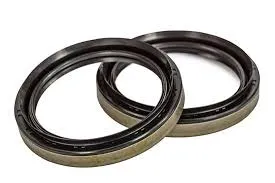8 月 . 01, 2024 07:41 Back to list
Exploring the Benefits and Applications of FKM Oil Seals in Industrial Machinery
Understanding FKM Oil Seals A Comprehensive Guide
FKM oil seals, also known as fluorocarbon rubber seals, are essential components in various mechanical systems. They are widely used in industries such as automotive, aerospace, manufacturing, and oil and gas due to their exceptional durability and resistance to harsh environments. This article will explore the characteristics, applications, advantages, and maintenance of FKM oil seals.
Characteristics of FKM Oil Seals
FKM, which stands for vinylidene fluoride and hexafluoropropylene, is a type of synthetic rubber known for its excellent thermal stability and chemical resistance. FKM oil seals can withstand extreme temperatures ranging from -20°C to 220°C (-4°F to 428°F), making them suitable for both high-temperature and low-temperature applications.
Moreover, FKM materials are highly resistant to various chemicals, including oils, fuels, solvents, and ozone. This resistance makes them ideal for sealing applications in environments that involve exposure to aggressive substances that would damage other types of rubber.
Applications of FKM Oil Seals
The versatility of FKM oil seals allows them to be used in numerous applications across different sectors. In the automotive industry, they are commonly found in engines, transmissions, and differentials, where they prevent the leakage of oil and ensure efficient operation. Their reliability enhances the longevity of vehicles while minimizing maintenance costs.
In aerospace applications, FKM oil seals are crucial for ensuring safe operations in various components, including hydraulic systems and fuel systems. Their ability to perform under a wide range of temperatures and pressures is vital in demanding situations experienced in aircraft operations.
Moreover, in the oil and gas industry, FKM seals are utilized in drilling and pumping equipment, where exposure to harsh chemicals and high temperatures is common. The ability to maintain performance in such extreme conditions is critical for the safety and efficiency of operations.
fkm oil seal

Advantages of FKM Oil Seals
One of the primary advantages of FKM oil seals is their longevity. Unlike traditional rubber seals, which may degrade over time due to exposure to heat, chemicals, and ozone, FKM seals offer extended service life. This durability translates to reduced downtime and maintenance costs, which is particularly beneficial for industries that rely on continuous operation.
Another significant benefit is their excellent sealing performance. FKM oil seals are designed to provide a tight seal, preventing the escape of fluids and the ingress of contaminants. This sealing capability is crucial for maintaining the integrity of mechanical systems and enhancing operational efficiency.
Maintenance of FKM Oil Seals
While FKM oil seals are known for their durability, regular maintenance is essential to ensure their proper function over time. Inspection should include checking for signs of wear, such as cracking or hardening, which may compromise their sealing ability. Additionally, ensuring that seals are correctly installed and not subjected to excessive friction or misalignment is critical for preventing premature failure.
Regular lubrication of moving parts that involve FKM seals can help reduce wear and prolong their service life. In applications with extreme exposure to chemicals or temperatures, periodic assessments are also recommended to confirm that the seals continue to perform as expected.
Conclusion
In summary, FKM oil seals represent a crucial component in numerous industrial applications due to their remarkable durability and resistance to harsh environments. Their effectiveness in preventing fluid leaks and protecting mechanical systems enhances operational efficiency and safety across various sectors. By understanding their characteristics, applications, advantages, and maintenance, industries can maximize the benefits of FKM oil seals, leading to improved performance and reduced operational costs.